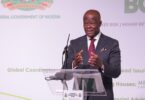Nigeria’s expenditure on motor spirit (also known as fuel) soared to N2.6 trillion in the first quarter of 2024, representing a 46% increase from the fourth quarter of 2023.
This data comes from the latest foreign trade report by the National Bureau of Statistics (NBS) for the first quarter of the year.
The cost of motor spirit imports was N1.8 trillion in the fourth quarter of 2023 and a combined N7.5 trillion for the entirety of 2023.
The increase in cost is linked to the depreciation of the exchange rate, which hit an all-time low at the end of the first quarter of 2024.
For example, in dollar terms, fuel imports amounted to approximately $2 billion, assuming a closing exchange rate of N1,309 as of March 2024.
This represents a significant drop in dollar terms from $4.4 billion in the corresponding period of 2023, where the NBS reported an import cost of N2 trillion, assuming the official exchange rate of N461/$1.
Data from the NBS reveals that Nigeria incurred a total of N4.39 trillion on the importation of “fuels and lubricants (processed)”, broken down into N2.6 trillion for motor spirit and N1.756 trillion for others.
The cost of importing fuel and lubricants is significantly affected by exchange rate depreciations over time, as the NBS reports the data in Naira.
A cursory analysis of the annual data using Nigeria’s official exchange rate on the last day of the year shows that imports in 2019 cost $7.1 billion (N2.56 trillion), $7.4 billion (N2.83 trillion) in 2020, and $14.5 billion (N6.3 trillion) in 2021.
In 2022, Nigeria incurred $21.69 billion (N9.9 trillion), the highest in recent years, with a drop to $13 billion (N11.8 trillion) in 2023.
The first quarter 2024 import cost of N4.39 trillion for fuel and lubricants is estimated at $3.3 billion.







